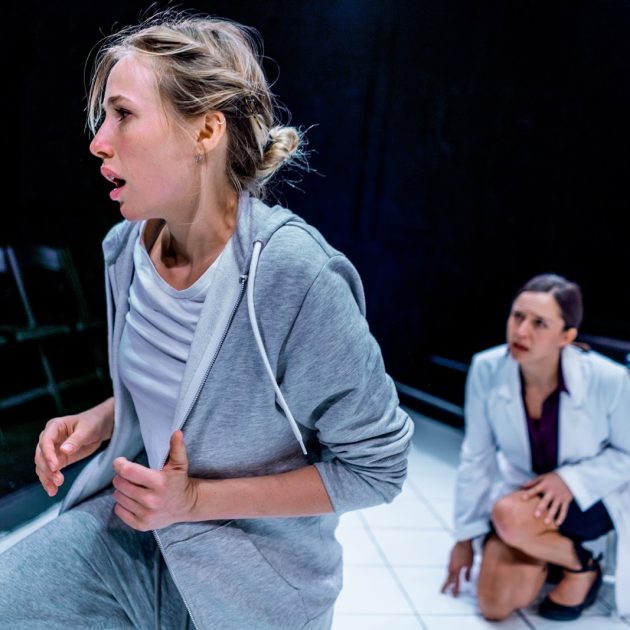
The Effect
THE EFFECT is a British play by Lucy Prebble, first seen at the National Theatre in London in 2012. The Sydney Theatre Company (STC) presented it in July, 2014. Andrew Henry (VERTICAL DREAMING) has Directed it for the Old Fitz season for Red Line.
THE EFFECT, received much praise, from the British Critics, at the National Theatre and had an highly appreciated outing in New York. It won The Circle Critics’ Award for Best New Play. I saw the original production (check my blog reviews) Directed by Rupert Goold, starring the amazing Billie Piper, as Connie and Jonjo O’Neill, as Tristan. Tom Goodman-Hill, as Dr Toby Sealey and Anastasia Hille as, Dr Lorna James.
THE EFFECT takes us into the world of neurology – the mysteries of of the human brain, psychopharmacology and its applied ethics – depression, love and guilt. Medicine and the mind. The Personal and the Political. It is a play of ideas. The giddy exhaltations of love and the bleak wasteland of depression, the ethics of the pharmaceutical industry in its pursuit of medical progress in the workings of the brain and the necessity to make good profit/business, and, perhaps ‘medical celebrity’. As in her play ENRON, Ms Prebble dares to bring to the theatre challenges for the brain and to the heart. It is intellectually provoking and also romantically perplexing. There are more questions, perhaps, than answers, but it can be a very stirring night of adult ‘entertainment’. In the time that has passed since the original production medical science in its discussions around the research into the complications of the brain, and of depression as illness, may have advanced to make some of this play superseded in its practice, but has not blunted the fascination or erudition of its core issues.
Connie (Emilie Cocquerel) and Tristan (Firass Dirani) are volunteers (and are being paid) for a month long drug trial in a pharmaceutical laboratory for a large company, experimenting with an anti-depressant, under the planning of Dr Sealey ( Johnny Nasser) and the administration of Dr James (Emma Jackson). The two young volunteers gradually ‘fall in love’ and we are not sure whether it is a dopamine provocation from natural consequence or that of the drug. (Is one of them on a placebo?) The dilemma of the young volunteers is mirrored by the gradually revealed historical personal stance between the two Doctors.
This production of the play by Andrew Henry is more interested in stylistic packaging and frenzied acting experimentation and movement, that results in a mostly superficial presentation of the emotional complications and intellectual rewards of the play. The star of this production is its visual aesthetic – the white tiled, in the round, Set Design by Brodie Simpson, and, especially, the panache and ‘sexy’ neon/strobe Lighting Design, that is becoming a signature of the work of Alexander Berlage.
The signal that there might be something out-of-balance with this production of this interesting play hits one as we enter the theatre by a noisy (over loud) live musical overture (composed and performed, by Benjamin Freeman). It is disconcertingly assaulting and uncomfortable. This might be an Artaudian conceit from the Director but it is not justified by what follows once the lights are crashed down/shut with the slamming of the theatre’s entrance door.
What follows is an acting presentation – style – that has attention paid to the superficialities of delivery (Movement Director, Shondelle Pratt) and speed of vocal effort, that is hardly attached to any focused necessity to present the clarities of the premise and arguments of the play, or, of truly investigated behaviours of human beings caught in the collateral damage of chemicals (artificial or natural) on the human brain. These actors gave performances of unengaged automatons – representations, puppets. Stylistic ‘form’ overriding experienced truths and enlightened argument. It became very exhausting to endure, ultimately disappointing.
Comparisons can be odious, but the National Theatre production of THE EFFECT left one subjectively devastated, all the characters revealed tragic consequences in the arc of the story – Anastasia Hille as Dr James, especially – and yet we were objectively, intellectually, stimulated. So stimulated that one needed to buy the play as quickly as possible to absorb all that Lucy Prebble had written. Devastated enough to seek a quick ‘drink’ to permit discussion and appreciation. THE EFFECT is quality playwriting that is not served adequately by this production.
The Sydney Theatre Company/Queensland Theatre Company production did not serve the play well either. Sydney audiences have lost out. It is difficult for me to recommend this production at the Old Fitz. I can recommend, in compensation, that you read THE EFFECT.